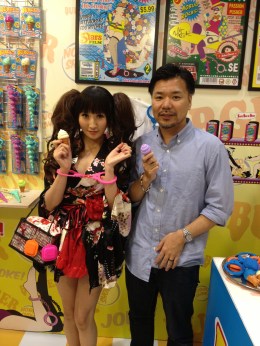
Kota Kuramoto and S&M artist Lina Yuzuki pose with their latest toys at the Asia Adult Expo 2013 in Hong Kong
Starched collar, smart haircut, designer jeans — if not for the state-of-the-art vibrator in his suitcase, Will Ranscombe could pass for a perfectly respectable business traveler. As general manager of sex-toy manufacturer Je Joue (French for I Play), he regularly shuttles prototypes from a factory in the southern Chinese city of Xiamen to design offices in the U.K. and San Francisco. Once, when an airport-security guard removed a strange, beach-stone-shaped object from his bag, Ranscombe offered her a demure explanation. “It’s a massage device,” he said, telling the truth, but not the whole truth. She pressed the humming prototype to her neck until a colleague whispered in her ear its usual point of application. “She jumped about 2 ft. in the air and nearly threw the thing,” Ranscombe says.
But once he enters the Hong Kong Convention and Exhibition Centre and stands at the threshold of the Asia Adult Expo 2013, he is in the company of his colleagues and competitors and has no fear of shocking anybody. He gets pride of place on the exhibitor’s floor, front and center at the show’s entrance. He displays his toys on backlighted pedestals that wouldn’t look out of place in an Apple store. Visitors approach with admiration, envy, and a few with plans to copy his innovative designs outright.
(MORE: China: How to Fake Your Way to the Top)
He points to Je Joue’s latest innovation, a set of three silicone balls — one round, the next squash shaped, the last like a dumbbell. It’s a Kegel-exercise training set. No company had thought to make such a set until Je Joue scanned the market and realized the one-size-fits-all balls were as inadequate as a gym with a single dumbbell. So they called in gynecologists, midwives and medical professionals to map out the relevant muscle groups. Their lead designer, a graduate of the Royal College of Art in London, drew 3-D mock-ups in CAD software. The blueprints were sent to their factory manager in Xiamen, who molded blobs of silicone into gently curved shapes that look as if they were fished out of a lava lamp. They were shipped to the medical professionals, who tested them on themselves and suggested refinements. “Medical minds and engineering minds met to produce what you see here,” Ranscombe says.
When the minds don’t meet, things get weird. Je Joue’s first toy “bombed,” Ranscombe says, because it was designed without any end users to guide its engineers. “It looked like a television remote control, and it was just as complicated.” He was kind of enough to share a picture, and he wasn’t exaggerating:
But while it took five years of hard work, mistakes and interdisciplinary brainstorms for Je Joue to build a brand of premium sex toys, all of that work can be snatched up in a flash — literally — when a competitor swings by the booth to snap a photo of the latest product. One distributor at the show says more people than he could count had walked past his display case with camera phones in hand, snapping photos of the devices, one by one, as if it were an all-you-can-eat buffet of intellectual property.
The speed with which shady men — shady even by adult-trade-show standards — can recreate these products is impressive. Ranscombe saw copies of his Kegel balls for sale at a fraction of the price on Taobao, the Chinese equivalent of eBay. It was only one week after the product launched in the country. “We were almost applauding them, how quickly they had done it,” Ranscombe says.
(MORE: The eBay of the East — Inside Taobao, China’s Online Marketplace)
To demonstrate how widespread China’s copycat economy can be, Ranscombe led a tour through the back alleys of the trade show. He would point at a vibrator at one of the premium booths. Then he’d turn down an aisle toward a smaller booth. “Do you not see?” he says, gesturing toward an identical-looking vibrator. “I mean it’s just a joke.” The owner of the joke was standing within earshot. Everyone exchanged glances — Ranscombe (defiant), the proprietor (annoyed), and this reporter (a bit embarrassed). Ranscombe continues, “These don’t last very long. The quality will be crap.” Asked if he would say anything directly to the owners, Ranscombe asks, “What’s the point?”
It’s strange to see the premium manufacturers accept China’s knockoff economy with a shrug — stranger still because they sue each other for lesser offenses. As of this writing, two premium manufacturers, Lelo and We-Vibe, are embroiled in a patent lawsuit over a charging component. Meanwhile a Chinese manufacturer can copy every component, brazenly putting a product on display a few meters away from the original, and it passes without comment.
(MORE: A Losing Battle Against Chinese Piracy)
While the copies irk Ranscombe, he says Je Joue hasn’t changed its plans to expand in China. The market is big enough to accommodate just about everyone. Suppose he focused his sales on China’s wealthiest 10%, a particularly brand-conscious group. They alone total 135 million people, so Je Joue can afford to have the manufacturers of cheap knockoffs nip at the lower-income market. The higher-income customers are a nation unto themselves. They want sex toys made with care, in a factory that washes down its machines with ethanol twice a day, where quality-control experts dump a toy in the reject bin if the charging light is half a millimeter askew. In other words, they want a brand. “They’re not just saying, Let’s buy a vibrator; they’re saying, Let’s buy a Je Joue,” Ranscombe says.
If anyone should worry about rip-offs, it’s Kota Kuramoto, proprietor of the Burger sex-toy booth. A four-person-deep crowd had gathered around his booth to see a baby-voiced, pig-tailed S&M artist from Japan strap a lanky volunteer to a chair. But beyond the performance was the main attraction, an assortment of what were hands down the zaniest toys at the show: vibrators shaped like ice cream cones, a condom-carrying case modeled after a fast-food burger box — all exceptionally weird and easy to copy. Kuramoto has had run-ins with copycats before. As a designer of iPhone cases, which involve the same silicon-shaping machinery as sex toys do, he once spotted a copy offered for sale in New York City. A perfect copy. “I see the packaging, right?” he says. “It says the exact same address of our company,” he says with a laugh.
Still, he doesn’t sweat it, even if he can’t explain why. “I don’t know,” Kuramoto says. “For me, I think, like, it’s O.K., cause, I don’t know.” Then he pulls out a notebook and flips through page after page of business cards from interested customers. “Some of them are like famous, big stores,” he says. “So, I hope.” It’s a hope buoyed by the rising affluence of China’s consumer class, and not even the most diligent copycats can deflate it.


